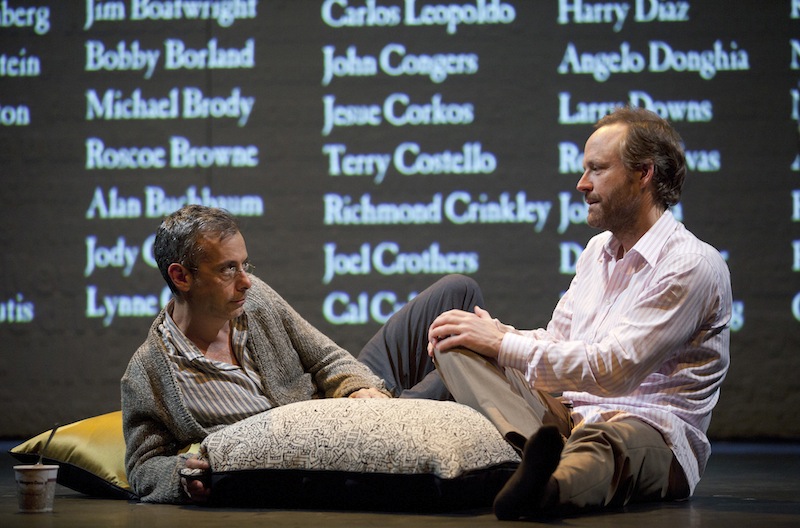Best Shows of 2011
#2 – Follies
 |
| Jan Maxwell and the ensemble of Follies |
From the first drum roll played by the luscious 27-piece orchestra, it is nearly impossible to not be swept away by the sheer grandeur of the current revival of Stephen Sondheim’s Follies. NY Times head critic Ben Brantley calls the show “one of the greatest musicals ever written,” and everything about this sumptuous production supports his assertion.
Follies is a legendary musical, one that rarely receives a full-scale production due to its momentous size and logistical complexity. The score is widely hailed as a masterpiece, and its pastiche-style songs are heavily featured in various Sondheim reviews and cabaret acts around the country. But one cannot fully appreciate Follies the score without seeing Follies the show, because hearing the songs in context wildly alters their meaning and reveals a nearly unmatched psychological complexity.
The pastiche songs, all intended to be part of the fictional Weismann Follies from which the show derives its name, provide an excellent comment on the play’s dramatic action, making apparent some heartbreakingly sad lyrical sentiments that can easily get lost among the songs’ upbeat tempos. And the book numbers are such superb monologues-in-song that you can literally find something new to appreciate with each listening. Sondheim really outdid himself on this one, and being able to hear these songs sung on a Broadway stage with such an excellent and full orchestra is a delight.
And then there is the disgusting embarrassment of riches that is the revival’s cast. Although not quite on the same level as her astounding work in A Little Night Music, Bernadette Peters gives an excellent performance as ex-Follies girl Sally Durant Plummer. Peters makes Sally into a tragically wounded and complex creature lost in the throes of self-delusion, a quality that is especially apparent during her haunting rendition of “In Buddy’s Eyes.” But so strong is this cast, and so uniformly excellent are the performances, that Peters is by no means the best actor on the stage.
Danny Burstein, who I found to be overrated in South Pacific and actively bad in Women on the Verge, is an absolute revelation as Buddy. He takes what is probably the least interesting of the central quartet and makes him an utterly fascinating example of a man who simply cannot admit that the woman he loves is no good. And during his climatic faux-Follies number, “The God-Why-Don’t-You-Love-Me Blues,” Burstein effortlessly becomes the modern reincarnation of a vaudeville comedian. Burstein simply slays this song and his performance in general, and will almost certainly be Tony-nominated for his efforts.
And then there’s Jan Maxwell. The brilliant, chameleon-like actress has played every type of role imaginable, but Phyllis Rogers Stone may just end up as her crowning achievement. Looking positively stunning in her golden gown, Maxwell is the embodiment of the woman who has everything and nothing at the same time. Trapped in a loveless marriage, Phyllis has built a wall of self-assurance and nonchalance around herself that steadily crumbles throughout the show. When she finally tears into her husband with one of the greatest gifts Sondheim ever gave an actress, the sensational “Could I Leave You?,” Maxwell explodes with such ferocity and deep seated rage you don’t know whether to cheer or run for the exit. And then, just in case you weren’t convinced of her brilliance, she stops the show again with her no holds barred song-and-dance routine for “The Story of Lucy and Jessie.”
This revival is one for the ages. I guarantee that at least once during the show, you will gasp in awe at its sheer brilliance. This production literally takes your breath away. For me, two moments in particular stand out: watching all of the ladies tap dance during “Who’s That Woman?” (the mirror number) while being mirrored by the ghosts of their younger selves in one of the most dizzying choreographic triumphs currently on Broadway, and the reveal of the climatic Loveland sequence, where the split-second fall of the front drop perfectly illustrates the mental break that has just occurred in the four leads and will propel them to the show’s end. Then there’s the hauntingly gorgeous duet “One More Kiss,” the majestic brilliance of the foreboding overture, the dreamlike interweaving of the ghosts of the characters’ past….I could go on and on. But it would be much more effective for you to run down to the Marquis Theatre and see for yourself why Follies is one of the best shows of the year, before it fades into memory on January 22nd.








